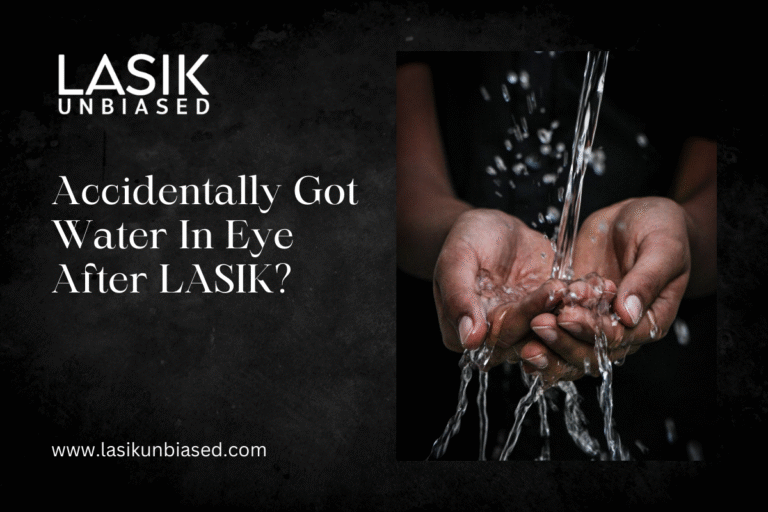Don’t panic. Accidentally getting water in your eye after LASIK is common, and in most cases, it is not a cause for major concern.
However, understanding the right steps to take can help ensure your eye remains healthy and your recovery stays on track.
LASIK surgery is a modern, life-changing procedure freeing many from glasses or contact lenses. However, post-operative care plays just as critical a role in ensuring its success. If you’re worried about water getting into your eyes, this guide will cover everything you need to know, including whether it’s harmful, how to manage the situation, and how to prevent issues in the future.
Understanding Why Water in the Eye is a Concern Post-LASIK
LASIK reshapes the cornea with a laser, and a temporary flap is created to allow this process. During recovery, this flap requires time to heal properly. Any contamination could potentially interfere with the healing process.
Why is water a problem?
- Bacterial Risks: Tap water and other sources may harbour bacteria that increase infection risks.
- Sensitivity: Post-surgery, your eyes are more sensitive to elements, making them vulnerable to irritation.
Your surgeon likely advised avoiding water splashes for at least a week after surgery as a crucial part of post-operative care. Such precautions aim to minimise complications during this fragile healing period.
What Should You Do if Water Gets in Your Eye?
While an immediate concern is understandable, it’s essential to handle the situation calmly yet effectively. Here’s what you can do:
1. Avoid Rubbing Your Eye
Resist the urge to rub. Rubbing can displace the corneal flap created during LASIK and cause complications. Gently blot around the eye with a clean tissue if water is around the area, but keep direct pressure off the eye itself.
2. Use Prescribed Eye Drops
After surgery, your doctor likely prescribed lubricating or antibiotic eye drops. If water comes into contact with your eyes, use the lubricating drops to ease irritation and flush out any minor contaminants. Only continue using antibiotic drops if your surgeon has specifically instructed you to do so. Be sure to carefully follow the post-operative dosing schedule provided by your surgeon to ensure proper healing.
3. Monitor for Unusual Symptoms
It’s crucial to watch out for any symptoms indicating an issue after water exposure:
- Redness that persists
- Sensation of something stuck in your eye
- Changes in vision
- Pain or swelling
If you notice any of these signs, contact your ophthalmologist immediately, as these may signal an infection or flap-related problem.
Can Tap Water Specifically Cause Harm After LASIK?
Yes, tap water can pose risks due to potential contamination with bacteria like Acanthamoeba. Even water that appears clean may harm your healing eyes. This is why swimming is typically discouraged after LASIK, as pools, lakes, and even saline water can harbour harmful organisms.
The takeaway: Avoid unnecessary water exposure immediately after surgery.
How Long Should You Avoid Getting Water in Your Eyes?
Surgeons generally recommend keeping water away from your eyes for the first 7 to 10 days post-surgery. During this window, careful hygiene is crucial to prevent complications. This means:
- No swimming in pools, hot tubs, or natural bodies of water.
- Avoid direct tap water contact during showers.
After this initial healing period, your eyes will become more resilient, but following your surgeon’s recommendations remains essential.
Why Aren’t Regular Activities Like Showering Risk-Free?
Even something as routine as a shower can pose risks after LASIK. Tap water can accidentally splash directly into the eyes, and shampoo or soap particles may irritate the healing surface. Use these tips while showering to minimise exposure:
Showering Tips Post-LASIK
- Avoid Direct Water Streams: Stand away from the stream to reduce splashing.
- Tilt Your Head Downward: This can help prevent water from running into your eyes.
- Avoid Water Splashing: During the first week, refrain from splashing water directly into your eyes while washing your face. Instead, use a clean, damp towel to gently cleanse the area around your eyes.
Long-term Precautions to Ensure Proper Healing
Even beyond the initial healing stages, practising care will help maintain the health of your eyes. Some helpful habits include:
- Wear Sunglasses Outdoors: Protect your sensitised eyes from UV light, wind, and other irritants.
- Clean Your Surroundings: Dust and debris can cause irritation even weeks later. Maintaining a tidy environment is beneficial.
- Follow Up with Your Doctor: Attending all scheduled post-op appointments ensures any latent issues are caught early.
What If You’re Experiencing Discomfort After Water Exposure?
Understanding when to seek professional help is vital. While mild irritation can be addressed with prescription drops, seek immediate medical attention if you experience:
- Intense pain
- Significant vision changes
- Discharge from the eye
Usually, your surgeon would have provided emergency contact details during your LASIK consultation.
How to Prevent Water Contact Next Time?
Preventing water in the eye after LASIK is primarily about being more mindful of daily routines. Here are practical tips to remain vigilant:
1. Use Protective Shields
Many surgeons provide plastic or specialised shields after the procedure. These can help prevent accidental rubbing or water contact, particularly while you sleep.
2. Use Face Towels Instead of Washing
Wipe your face with a clean, damp towel instead of splashing water directly. This keeps the area clean without exposing your eyes unnecessarily.
3. Avoid Makeup and Lotions
Makeup particles or lotion residue can mix with water and enter your eyes. Avoid applying these products during initial recovery.
FAQs About Water Exposure After LASIK
Is it dangerous to cry after LASIK surgery?
Crying is generally safe, as natural tears don’t harm the healing process. However, avoid rubbing your eyes.
What about swimming with goggles post-surgery?
It’s best to wait at least 3-4 weeks before swimming, even with protective goggles. Consult your surgeon for specific guidance.
When can I reintroduce water activities like snorkelling or sauna use?
Typically, you can resume such activities after 4-6 weeks, given no complications arose during your recovery.
Your Path to Clear Vision
Getting water in your eye after LASIK is rarely a major setback, but knowing how to respond is key to protecting your healing eyes. By following preventive measures and adhering to your surgeon’s instructions, you can minimise risks and enjoy the full benefits of your enhanced vision.
If you’re unsure or experience any discomfort, reach out to your ophthalmologist without delay. Your eyes deserve the utmost care, especially during this critical recovery period.


